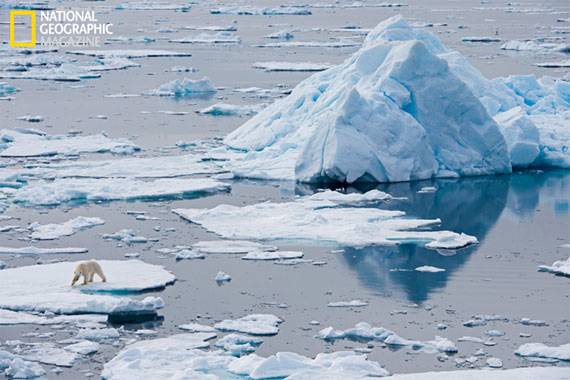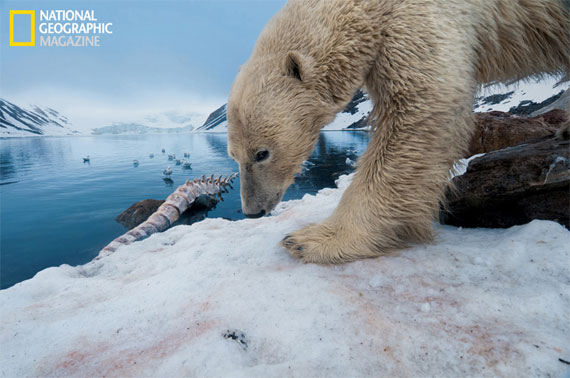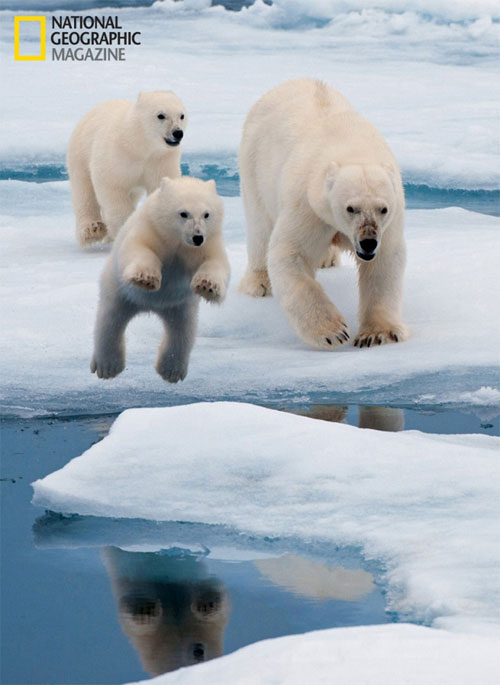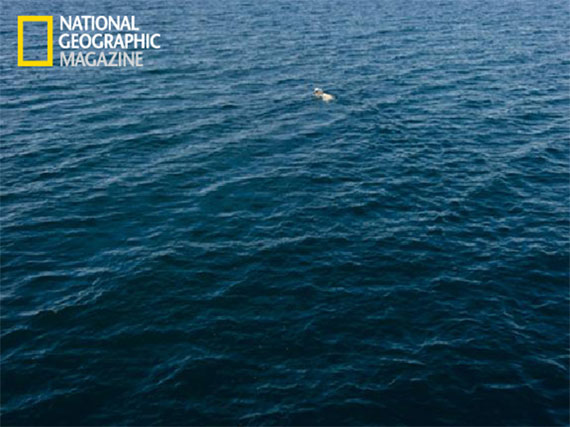Visions of the Arctic
Posted on 13 July 2011 by John Cook
Guest post by photographer Florian Schulz. Photos courtesy of Florian Schulz/National Geographic from the July 2011 issue of National Geographic magazine, on newsstands June 28.
A thundering bang rips me out of my sleep. I open my eyes but see only darkness. For a moment I try to figure out where I am. Then I hear it again: another deep, hollow clang, followed by a high-pitched scraping noise. I slowly come to and remember that I am below deck on an old sealing vessel, traveling to northern Svalbard, an archipelago in the European Arctic, with the IMAX film team. 
A polar bear rides a summer sea-ice raft off Norway's Svalbard archipelago. Sea ice provides crucial habitat for the Arctic's top predator, but warming temperatures are creating extended ice-free periods that tax bears.
Thinking the boat might have run aground, I quickly rush up to the helm and immediately understand. We are entering a part of the Barents Sea that is full of loose sea ice. Like a bumper car, our ship tries to find open passage between the ice floes, but collisions are unavoidable.
We now have entered the true home of Ursus maritimus, the sea bear. As we have multiple observations of polar bears over the days, I am beginning to fully understand the origin of this name. I have observed bears swimming for miles in freezing water that would render a human immobile within minutes. I have watched them dive under ice floes to surprise seals hauled out on the other side, and have even seen them surface with a small ringed seal in their mouth after catching it underwater. I have been amazed at how they seem to be completely at ease resting on small pieces of ice, drifting miles from shore, surrounded by open water. No doubt, the pack ice environment is their home and they want to hang on to the ice as long as it has not melted yet. Out here on the ice, bears can hunt for seals, their most important food.

Ashore on Svalbard, a male polar bear investigates a whale's backbone. Fat reserves from hunting ringed and bearded seals, and sometimes walruses, must carry bears through lean summers.
On the west coast of Svalbard, I have the chance to observe bears that have already been forced to land as the sea ice has melted earlier. Over a week, I spend anchored in a little bay near a washed up fin whale carcass that is attracting many polar bears.
After spending day after day observing, filming, and photographing, we now recognize individual bears and can pick out new arrivals. Some of the newcomers arriving from the sea ice have beautiful white fur, while the fur of the bears that have been at the carcass for a long time is yellowish from the whale oil in the water.

"When the female saw him," Schulz said, "she huffed at her cubs, and then they just pinned their ears back and ran." Leaping over floes, they kept going long after they'd made good their escape.
I am beginning to wonder if this carcass is a blessing or a curse for the bears. It attracts large numbers of them, but it hardly seems to provide enough meat to feed them well. The cubs of the bears that have been around for a while appear malnourished and far too small for the end of June. With so many bears close to the carcass, a lot of energy is spent fighting over the food. At the same time, the remaining meat is a sure bet for the bears, which are now stranded on land as the ice retreats. In spring and summer, without access to seals, polar bears have to live on scraps, mainly surviving on the valuable fat reserves they have built up during winter. On land, food is scarce and consists of washed-up marine mammals and birds’ eggs. I have even seen bears eating seaweed. Polar bears are in their true element when hunting seals out on the ice, which in my mind is why the newly arriving bears look so much healthier. I wonder how the bears will cope with the ever-retreating sea ice, as they will lose their hunting platform for seals and be forced to rely on sources of less nutritious food.
The effects of global warming are intensified in the far north. Temperatures have risen at twice the global average in the arctic regions. Scientists estimate, that by 2050 the Arctic Ocean may be largely ice free in summer.
It is ironic that the polar bear, the king of the Arctic, which has always been able to withstand anything nature throws its way - the most severe cold, the fiercest storms, and the coldest water - now faces a new enemy it is not equipped for: global warming.
As I am documenting the polar bears in their back ice environment a single image often comes to my mind. It is a polar bear swimming for his life in an ice-free ocean. Year after year he has retreated further north towards the ice edge, where not only he but many animals begin to concentrate, until the final year, when all the ice has melted and he is surrounded by hundreds of miles of open ocean.
 Florian Schulz is a professional nature photographer who has dedicated more than a decade to promoting the creation of wildlife corridors. As a part of his ongoing project Freedom to Roam®, Schulz has documented some of North America’s last remaining wild places, from Baja California to the Beaufort Sea. The youngest founding member of the International League of Conservation Photographers (ILCP), Schulz has won numerous awards, including Environmental Photographer of the Year, Conservation Photographer of the Year, and an Independent Publisher Book Award for his first book Yellowstone to Yukon: Freedom to Roam.
Florian Schulz is a professional nature photographer who has dedicated more than a decade to promoting the creation of wildlife corridors. As a part of his ongoing project Freedom to Roam®, Schulz has documented some of North America’s last remaining wild places, from Baja California to the Beaufort Sea. The youngest founding member of the International League of Conservation Photographers (ILCP), Schulz has won numerous awards, including Environmental Photographer of the Year, Conservation Photographer of the Year, and an Independent Publisher Book Award for his first book Yellowstone to Yukon: Freedom to Roam.
A native of Germany, Schulz spends eight to ten months a year in the field, often joined by his wife, Emil Herrera Schulz. For more information, please visit his website at www.VisionsoftheWild.com.
To the Arctic:
Florian Schulz spent many months in the Arctic, where he endured subfreezing temperatures - camping on ice sheets, diving beneath icebergs, and riding hundreds of kilometers on dogsleds – to document the incredible diversity of life for his upcoming book, To The Arctic, the companion book to the IMAX Theatre film of the same name by MacGillivray Freeman Films.































 Arguments
Arguments































[DB] Thank you for providing an object lesson of the denialist mentality. It would be interesting if a dissembler were to even once see the "larger scale view" without the veils of confirmation bias blinding their eyes.
And what is said polar bear to do when those "many miles" become many hundreds of miles? When meals become weeks and months apart?
Your position is impoverished of merit.
[dana1981] Please read the article more carefully. The author is not claimng that the polar bear in the picture is in distress. He's talking about 'an image in his mind' of the inevitable day in the future when the Arctic is almost entirely ice free, and polar bears experience the consequences.
[DB] In the spirit of not reading or misreading posts on Polar Bears, here are a few more with even more, regrettably, scientific information:
[DB] I plead guilty to a somewhat emotional reaction to a serial dissembler.
Mea culpa. ;-)